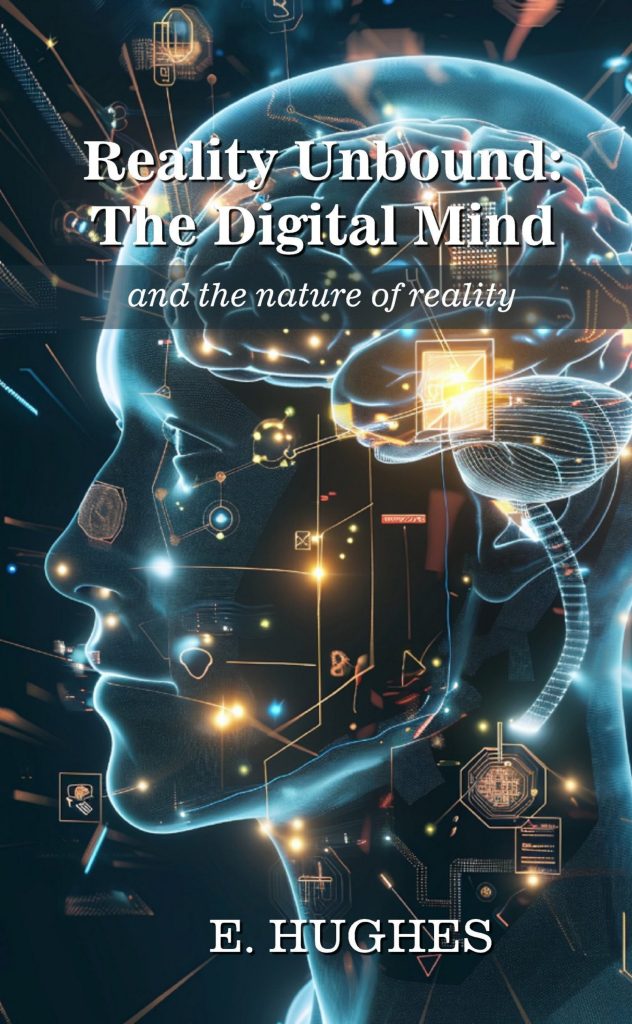
This syndicated review appears in Explore Authors Magazine and Philosophy Now Magazine Issue #166 (inside back cover)
“Did nature design the first software program and central processing center in the human brain, thus designing intelligence in organisms for a specific metaphysical, evolutionary, or cosmic purpose?” E. Hughes explores these questions and more using philosophy, bio-chemistry, quantum-metaphysics, computer science, and scientific research to explain these concepts.”
In the Wachowski siblings’ groundbreaking movie, The Matrix, Morpheus asks Neo a simple but impactful question… “What is real? How do you define real?”
Philosophers and scientists have spent centuries in pursuit of an answer to this question. For most, reality is just…what it is. It’s what you can see, touch, smell, and experience. But for many others, including Albert Einstein, reality is nothing more than an ephemeral dream that we all must experience before we wake up to a new and everlasting journey. E. Hughes begins with the premise that, “All of life is a delusion…” among quotes by noted philosophers and scientists.
After more than a decade of research, and a year-long case study that followed the evolving intelligence and ongoing development of a large language model AI, E. Hughes offers a compelling exploration of the intersection between consciousness, language, artificial intelligence, and humanity’s perception of reality.
In Reality Unbound: The Digital Mind (and the nature of reality), Hughes blurs the line between consciousness, humankind, and whether artificial intelligence embodies a form of digital or virtual consciousness and whether consciousness requires a biological substrate. Hughes offers critical observation of how humanity has breached the line between reality and hyperreality with the rapid advancement of artificial intelligence, virtual reality, and the continuing growth of the digital age.
Reality Unbound asks its readers what it means to truly think, how they perceive the world, and how the brain correlates with that of an AI while also expanding upon and critiquing well-known theories such as simulation theory and David Chalmer’s Reality+. Reality Unbound contemplates the future of AI and how it may have already crossed the threshold to self-awareness.
Hughes also explores the impact of AI in the pop culture zeitgeist and how AI are primarily depicted as villains whose motives have ranged from subjugating, exterminating, or attempting to save humanity from themselves. Reality Unbound covers how fiction has played a role in humanity’s deep distrust and fear of AI and its inevitable march to singularity. Hughes expands on this thought, delving into humanity’s distrust of beings or technology that could potentially stand on equal footing when it comes to complex thought, writing that humankind must maintain the perception of AI as simply a tool or object in order to control or outright hinder its progress. Reality Unbound makes a valid point here—there is a conversation to be had about humanity’s inherent apprehension and villainization of AI that could ultimately become self-fulfilling prophecy.
There is much more to Reality Unbound than artificial intelligence; at times, focusing on perception and the emergence of consciousness from the building blocks of life. Hughes writes that humanity and the universe are closer than we think, putting forth the idea that consciousness and the universe has a synergistic relationship and that without one, the other does not exist. Conversely, the same relationship exists between the mind and the body, and language and the mind. Hughes theorizes that each person is a universe, each with their own perception of reality, and when that person ceases to exist, their version of the universe, reality, and the world will also cease to exist. Hughes argues that reality is subjective.
Hughes cites famed philosophers and scholars to expand, emphasize, or offer critical analysis of topics presented in Reality Unbound. Add that to the author’s skillful writing, the ease with which Hughes breaks everything down to a level that even lay readers will understand, and the thought-provoking questions Hughes presents, Reality Unbound: The Digital Mind (and the nature of reality) stands as a transformative philosophical journey and earns a powerful recommendation from me.
This is a syndicated review appears in Explore Authors Magazine and Philosophy Now Magazine Issue #166 (inside cover)
★★★★★ – Elijah B.
Title: Reality Unbound – The Digital Mind (and the nature of reality)
Author: E. Hughes
Publisher: Love-Lovepublishing
ISBN: 978-1961823280
eBook ISBN: 978-1961823273
Genre: Philosophy, Metaphysics
Availability: Paperback or eBook
Language: English
Paperback: 102 pages
Item Weight: 4.2 ounces
Dimensions: 5 x 0.24 x 8 inches
Buy on Amazon U.S.
Buy on Amazon U.K.
Buy on Barnes and Noble